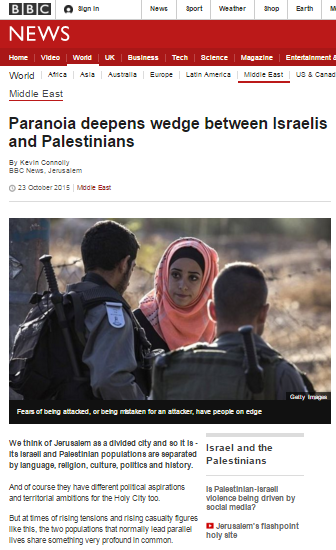Among the BBC News website’s generous coverage of the US administration’s ‘Peace to Prosperity’ proposal in late January was an article by Aleem Maqbool in which readers were told that:
“White Evangelical Christian Americans formed a strong voting block for Donald Trump in 2016, with around 80% voting for him.
Many Evangelical Christians believe that God promised the Holy Land to Jews and that their return to power across the whole territory will bring about the Second Coming of Christ.
But that is not only helping to shape policy because President Trump wants their votes again in November.
There are also Evangelicals within the Trump administration itself, like Vice-President Mike Pence and Secretary of State Mike Pompeo, who have reportedly been pushing for the kind of support for Israel’s expansionist aspirations as detailed in the new plan.
Those aspirations all but do away with the notion of having sovereign Palestinian and Israeli states existing side by side, as previous US administrations had said they wanted.”
Readers were not provided with any context. For example AP reported in January that:
“Trump won a clear majority of white evangelical Protestant votes in 2016 […] [b]ut those evangelicals’ alignment with the Republican Party predated Trump and has risen steadily since 2009, according to data from the nonpartisan Pew Research Center.”
And:
“Trump has not greatly outperformed his GOP predecessors with white evangelicals”.
Neither did Maqbool’s monochrome portrayal provide any information concerning the prominence of the issue of Israel in comparison to other issues (such as abortion or social justice) among Evangelical voters.
Listeners to the March 2nd edition of the BBC Radio 4 ‘Today’ programme however found that narrative repeated, along with the promotion of linkage to the election in Israel.
Presenter Mishal Husain introduced the item (from 46:47 here) with the inaccurate claim that the US proposal concerns only “the Palestinians”: [emphasis in italics in the original, emphasis in bold added]
Husain: “Israelis are voting today in their third general election in a year after neither prime minister Benjamin Netanyahu nor opposition leader Benny Gantz were able to form a government on the previous two occasions last year. This time Mr Netanyahu is claiming credit for Donald Trump’s so-called Deal of the Century on the Palestinians. And this is a vote that could affect Mr Trump’s re-election hopes in November as his stance on Israeli policies is linked to that of his Evangelical Christian supporters. Our Middle East editor Jeremy Bowen reports.”
Bowen began his report at the archaeological site of Megiddo, claiming that:
Bowen: “This place gives you an idea of the power and influence of Christian Evangelicals’ view of Israel has in the US. I can see one, two, three, maybe five groups of American pilgrims praying, reading the bible and who share this strong belief that America needs to support Israel because of the vital part it plays in their religious beliefs.”
He spoke to one of those tourists, Ray Armstrong.
Bowen: “Now Christian Evangelicals in the US have a strong interest in Israel, don’t you? You feel a strong affinity.”
Armstrong: “We do. So we are a large – at this time, for better, for worse – a large political influence.”
Bowen: “Now President Trump has been very forward in his support for Israel, recently in his Deal of the Century as he calls it [sic]. Do you think that’s the kind of thing that Evangelicals would support?”
Armstrong: “I think there will be those Evangelicals who will. I think we need to be thorough in our thinking. I think we need to understand consequences of our words. We just need to be careful in what we do and how we go about it.”
That rather vague response did not deter Bowen from continuing to tout his debatable hypothesis.
Bowen: “It is only about six months since the last election and this is the third time in a year but the Americans, by publishing Donald Trump’s plan, have made changes to the political landscape. It’s enabled prime minister Benjamin Netanyahu to say that this is a great deal for Israel and if you want it, vote for me; I’m the only person who can deliver it.”
Ignoring the obviously highly relevant fact that the US proposal was rejected by the Palestinians even before it was published, Bowen moved on to Shiloh where he promoted very dubious linkage between the beginning of construction of a school and the US proposal published in late January.
Bowen: “And it’s not just politics: the physical landscape of the place is changing, as it’s changed over many years, with the expansion of Jewish settlements on occupied land.”
Notably, throughout Bowen’s report BBC audiences were given no evidence to support Mishal Husain’s opening claim that the outcome of the March 2nd Israeli election “could affect Mr Trump’s re-election hopes in November”.
Bowen’s efforts to link the Israeli election to the US ‘Peace to Prosperity’ proposal (even though the election cycle began over a year before that proposal was published) were also evident in a filmed report aired on BBC television news programmes.
Bowen: “The prime minister is claiming credit for Donald Trump’s so-called Deal of the Century – an attempt to end the conflict on Israel’s terms. It allows Israel, in defiance of international law, to annex settlements built on land Palestinians want for a state.”
Viewers were also given an inaccurate and simplistic view of the background to the Arab-Israeli conflict:
Bowen: “And as ever, it’s come down to control of the land. That’s always been at the centre of the conflict, a century ago and today.”
In addition they heard Bowen (who only last October asserted that “there haven’t been all that many” Palestinian terror attacks “in recent years”) claim that US policies of the past three years are “sharpening the conflict on the ground” with no concrete evidence provided to support that allegation.
Bowen: “The big changes, political and diplomatic and especially President Trump’s out and out support for the Israeli government is sharpening the conflict on the ground and you can see it in places like this. Conflict is normal for yet another generation. The election won’t change that.”
The narrative the BBC has chosen to promote is very clear: the US ‘Peace to Prosperity’ plan – which has been portrayed by Jeremy Bowen and his colleagues in a uniformly negative light since even before it was made public – is, according to the corporation’s Middle East editor, first and foremost the product of Trump’s dependence upon Evangelical Christian support to get re-elected in November, and has the added effect of aiding Netanyahu’s election campaign by creating “changes to the political landscape”.
On the Israeli front, that “highest calibre” analysis has yet to bear fruit, with Netanyahu’s party (after 99% of the votes were counted) having secured just one more seat in the Knesset than it did in April 2020 – nine months before the US plan was made public.
Related Articles:
How will the BBC cover Israel’s election?
BBC News promotes non-starter topic to advance Israel election narrative
BBC’s Bateman sketches a simplistic portrait of the Arab Israeli vote




